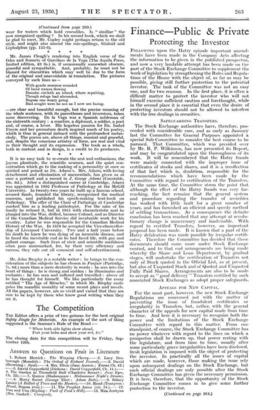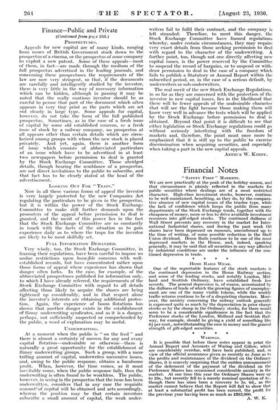Finance—Public & Private
Protecting the Investor
Forzowixo upon the Hatry episode important amend- ments have been made in the Company Acts affecting the information to be given in the published prospectus, and now a very laudable attempt has been made on the part of the Stock Exchange Committee to supplement the work of legislation by strengthening the Rules and Regula- tions of the House with the object of, as far as may he possible, giving still further protection to the potential investor. The task of the Committee was not an easy one, and for two reasons. In the first place, it is often a difficult matter to protect the investor who will not himself exercise sufficient caution and forethought, while in the second place it is essential that even the desire of protecting investors should not be allowed to interfere with the free dealings in securities.
SAFEGUARDING TRANSFERS.
The Stock Exchange authorities have, therefore, pro- ceeded with considerable care, and as early as January last the Committee for General Purposes appointed a special Sub-Committee to consider the best course to be pursued. That Committee, which was presided over by Mr. R. P. Wilkinson, has now presented its Report, and may be congratulated upon the thoroughness of its work. It will be remembered that the Hatry frauds were mainly connected with the improper issue of certificates of stocks and shares, and it is a recollection of that fact which is, doubtless, responsible for the recommendations which have been made by the Committee with regard to certification of the Transfers. At the same time, the Committee stress the point that although the effect of the Hatry frauds was very far- reaching, the fact remains that the general system and procedure regarding the transfer of securities has worked with little fault for a great number of years, and has furnished an efficient and speedy method of settling transactions. As a consequence the definite conclusion has been reached that any attempt at revolu- tionary change is unnecessary and inadvisable. With regard to certified Transfers, however, an important proposal has been made. It is known that a part of the Hatry defalcation was made possible by irregular certifi- cates. Therefore the Committee has decided that those documents should come more under Stock Exchange control, and to that end arrangements are being made whereby the Share and Loan Department, by gradual stages, will undertake the certification of Transfers not only of Stock quoted in the Official List, as at present, but also of Unquoted Stock and of Quoted and Unquoted Fully Paid Shares. Arrangements are also to be made to accept as " good delivery " Transfers certified by such associated Stock Exchanges as adopt proper safeguards.
APPEALS FOR NEW CAPITAL.
For the most part, however, the new Stock Exchange Regulations are concerned not with the matter of preventing the issue of fraudulent certificates or irregularity in Transfers, but, rather, with the general character of the appeals for new capital made from time to time. And here it is necessary to recognize both the power and the limitations of the Stock Exchange Committee with regard to this matter. From one standpoint, of course, the Stock Exchange Committee has no power whatever with regard to the lines on which a prospectus shall be drawn up, that power resting with the legislature, and from time to time, usually after some particularly grave irregularities have been disclosed, fresh legislation is imposed with the object of protecting the investor. In practically all the issues of capital which are made, however, those making the issue rely upon subsequent dealings on the Stock Exchange, but such official dealings are only possible after the Stock Exchange Committee has given the necessary permission. It is here, therefore, that the opportunity of the Stock Exchange Committee comes in to give some further protection to the investor.
(Continued on page 264.) Finance—Public and Private (Continued from paje 283.) PROSPECTUSES.
Appeals for new capital are of many kinds, ranging from issues of British Government stock down to the prospectus of a cinema, or the prospectus of some company to exploit a new patent. Some of these appeals—most of them, in fact—are made through the medium of the full prospectus advertised in the leading journals, and concerning these prospectuses the requirements of the law are now very stringent, so that, if the documents are carefully and intelligently studied by the investor, there is very little in the way of necessary information which can be hidden, although in passing it may be noted that the really cautious investor should be as careful to peruse that part of the document which often appears in very tiny print as the parts which are set out clearly in large type. Some appeals for capital, however, do not take, the form of the full published prospectus. Sometimes, as in the case of a fresh issue of capital by some old established concern, or a fresh issue of stock by a railway company, no prospectus at all appears other than certain details which are circu- larized among groups with whom the new stock is placed privately. And yet, again, there is another form of issue which consists of abbreviated particulars of an issue which have to be advertised in at least two newspapers before permission to deal is granted by the Stock Exchange Committee. Those abridged details, though bearing the semblance of a prospectus, are not direct invitations to the public to subscribe, and that fact has to be clearly stated at the head of the advertisement.
LOOKING OUT FOR " TRAPS."
Now in all these various forms of appeal the investor is very largely protected by the new Companies Act regulating the particulars to be given in the prospectus, but it is within the power of the Stock Exchange Committee to make still further demands upon the promoters of the appeal before permission to deal is granted, and the merit of this power lies in the fact that the Stock Exchange Committee are so constantly in touch with the facts of the situation as to gain experience daily as to where the traps for the investor are likely to be most skilfully set.
FULL INFORMATION DEMANDED.
Very wisely, too, the Stock Exchange Committee, in framing their regulations, have been careful to impose no undue restrictions upon bona-fide concerns with well- established records, but have concentrated rather upon those forms of appeal where experience has shown that danger often lurks. In the case, for example, of the abbreviated prospectuses published for information only, to which I have already referred, the requirements of the Stock Exchange Committee with regard to all details affecting those likely to acquire the shares are being tightened up considerably, and in that respect alone the investor's interests arc obtaining additional protec- tion. Again, the experience of boom flotations has shown that another danger exists in the establishment of flimsy underwriting syndicates, and as it is a dan.er, perhaps, not sufficiently suspected or comprehended by the public, a word of explanation may be useful.
UNDERWRITING.
At a moment when the public is " on the feed " and there is almost a certainty of success for any and every capital flotation—undesirable or otherwise—there is naturally a great opportunity for the establishment of flimsy underwriting groups. Such a group, with a mere trifling amount of capital, underwrites successive issues, and, owing to the public response, obtains a handsome profit. When, however, the time comes, as it must inevitably come, when the public response fails, then the underwriting is often found to be woraless. The public, however. in seeing in the prospectus that the issue has been underwritten, considers that in any case the requisite amount' of capital will be obtained and acts accordingly, whereas the position may be that certain investors subscribe a small amount of capital, the weak under-
writers fail to fulfil their contract, and the company is left stranded: Therefore, to meet this danger, the Stock Exchange Committee have framed regulations whereby, under certain circumstances, they may require very exact details from those seeking permission to deal with regard to the character of the underwriting. A further point, too, though not one directly affecting new capital issues, is the power reserved by the Committee to suspend the record of bargains, or to suspend or with- draw permission to deal in the case of a company which fails to publish a Statutory or Annual Report within the subscribed period, or, in the ease of a serious default, by underwriters or sub-underwriters.
The real merit of the new Stock Exchange Regulations, in so far as they arc concerned with the protection of the investor in new capital issues, lies in the likelihood that there will be fewer appeals of the undesirable character that will see the light because those making them will know very well in advance the tests which will be applied by the Stock Exchange before permission to deal is obtained. Beyond that point it is difficult to see that either legislation or Stock Exchange regulations could go without seriously interfering with the freedom of markets and, therefore, the point must once more be emphasized that it is still up to the public-to exercise discrimination when acquiring securities, and especially when taking a part in the new capital appeals.
ARTHUR W. KIDDY.

































 Previous page
Previous page